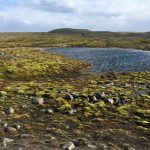As President Guðni expressed in our meeting, Iceland seems to be consistently pursuing for independence from the rest of Europe. They see value in maintaining their island-ness rather than integrating into their economy. In the past 30 years, I would say they’ve succeeded in doing so proficiently. Furthermore, they saw the benefit of diversifying their economy with China as an Asian superpower. This resulted in Preferential Trade Agreements initiated in 2006, which has proven to benefit both countries greatly. In this entry, I will discuss the ways this trade agreement with China has shaped Iceland’s position in the international arena.
Owing to its remote location, Iceland had often been isolated from other European countries, and daresay the international arena. It is one of the few Nordic countries that are not a part of the European Union. However, they are well integrated into the European economy (Lanteigne, 2010). President Guðni pointed out that at the height of Iceland’s financial success, their banks such as Landsbanki had a strong standing in Europe. When Icesave collapsed in financial crisis of 2008, however, UK government had to step in to reimburse losses from depositors in their country (Wallace, 2015). They even went as far as declaring Iceland as a terrorist country, which severed the relationship between the two countries. While this was devastating for all parties involved, this shows their financial industry was regarded highly prior to the crash.
Hence, the PDAs that started in 2006 acted as a safeguard when the financial crash happened. While the relationship with rest of Europe has gone sour, Iceland had a strong standing in the international arena. The trade agreements allowed China to export textiles, clothing, ships and clothing, and Iceland to export fishery products and electronic goods. This ensured the country still had a constant flow of foreign currency that was crucial for the economy. According to Marc Lanteigne, “Reykjavik became the first European government and first non-Asia Pacific advanced economy to initiate formal preferential trade negotiations with China”. For Iceland, it shows that at times of adversity, they stand firmly in the international arena. Though they are a small nation, they’ve demonstrated their power through negotiating with a much larger economy and a “formidable political power” (2010).
On a substantial scale, the trade agreements provided a relaxed financial infrastructure between the two countries. For example, the Chinese real estate developer Huang Nubo gained interest in purchasing land in Northeast Iceland for eco-tourism development (Hastings, 2014). This also helped to keep the fishery industry afloat, given they had been a main source of trade with China and the country’s main source of income before financialization.
For Iceland’s economy, it was a smart move to diversify. Being an island nation situated between US and EU, they are both big superpowers that could be imposing for the country to stand on their own. Through initiating Preferential Trade Agreements with China, Iceland opened a new path for themselves to do business in Asia instead. Despite the difficulties they might face on a national level, they are on their way to building a diversified economy that can sustain through times of crisis.
Bibliography
Hastings, Jesse Guite. “The Rise of Asia in a Changing Arctic: A View from Iceland.” Polar Geography37, no. 3 (2014): 215-33. doi:10.1080/1088937x.2014.934315.
Huijbens, Edward H., and Dominic Alessio. “Arctic ‘concessions’ and Icebreaker Diplomacy? Chinese Tourism Development in Iceland.” Current Issues in Tourism18, no. 5 (2013): 433-49. doi:10.1080/13683500.2013.837867.
Lanteigne, Marc. “Northern Exposure: Cross-Regionalism and the China–Iceland Preferential Trade Negotiations.” The China Quarterly202 (2010): 362-80. doi:10.1017/s0305741010000287.
Wallace, Tim. “UK Left out of Pocket as Iceland Draws a Line under Bank Collapse.” The Telegraph. September 18, 2015. Accessed June 17, 2018. https://www.telegraph.co.uk/finance/financialcrisis/11875720/UK-left-out-of-pocket-as-Iceland-draws-a-line-under-bank-collapse.html.

